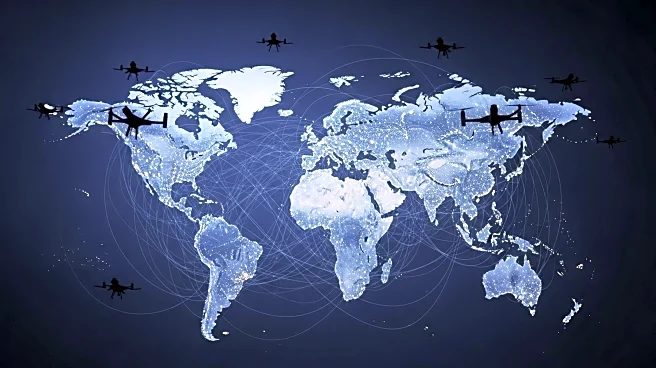What is the story about?
What's Happening?
Shadow economies, often referred to as 'black markets,' are increasingly becoming a significant concern for military planners and national security practitioners. These economies operate outside the bounds of regulatory, taxation, and enforcement frameworks, enabling regimes and insurgent groups to sustain themselves despite international sanctions. Notable examples include Iran's illicit oil exports and North Korea's complex illicit activities, such as counterfeit currency and cyber theft. Russia, too, has been evading sanctions through oil smuggling and the use of 'dark fleets' of tankers. These shadow economies not only undermine sanctions but also strain international alliances and prolong conflicts, as seen in Russia's ongoing war efforts in Ukraine. The expansion of these economies has been further fueled by geopolitical tensions and the rise of cybercrime, which facilitates the laundering of illicit funds.
Why It's Important?
The growth of shadow economies poses a direct challenge to the effectiveness of international sanctions and economic statecraft. By providing alternative revenue streams, these economies allow rogue states to circumvent economic pressures intended to coerce behavioral changes. This undermines the strategic stability and cohesion of international alliances, as some countries may turn a blind eye to or even support these illicit activities. The persistence of shadow economies also necessitates a reevaluation of current military and economic strategies, as traditional sanctions are no longer sufficient to deter or contain these activities. The ability of these economies to sustain conflicts and empower illicit actors highlights the need for a more integrated approach to national security that includes financial intelligence and cybersecurity measures.
What's Next?
To combat the influence of shadow economies, military planners and policymakers are encouraged to adopt a multifaceted approach. This includes enhancing intelligence capabilities to map and disrupt illicit financial networks, strengthening the enforcement capacities of U.S. allies, and targeting specific channels of illicit activity with more precise sanctions. Additionally, there is a call for increased diplomatic engagement and economic incentives to dissuade 'permissive jurisdictions' from facilitating shadow trade. Integrating cybersecurity efforts with financial intelligence is also crucial to countering cyber-enabled illicit finance. These steps aim to mitigate the impact of shadow economies on global stability and ensure that sanctions remain an effective tool of economic statecraft.
Beyond the Headlines
The rise of shadow economies also raises ethical and legal questions about the global financial system's integrity. As these economies grow, they challenge the legitimacy of formal trade and financial systems, potentially leading to a shift in global power dynamics. The involvement of state and non-state actors in these illicit activities blurs the lines between legal and illegal operations, complicating enforcement efforts. Furthermore, the reliance on shadow economies by some countries may lead to increased geopolitical tensions and conflicts, as states vie for control over these lucrative but illegal markets.
















